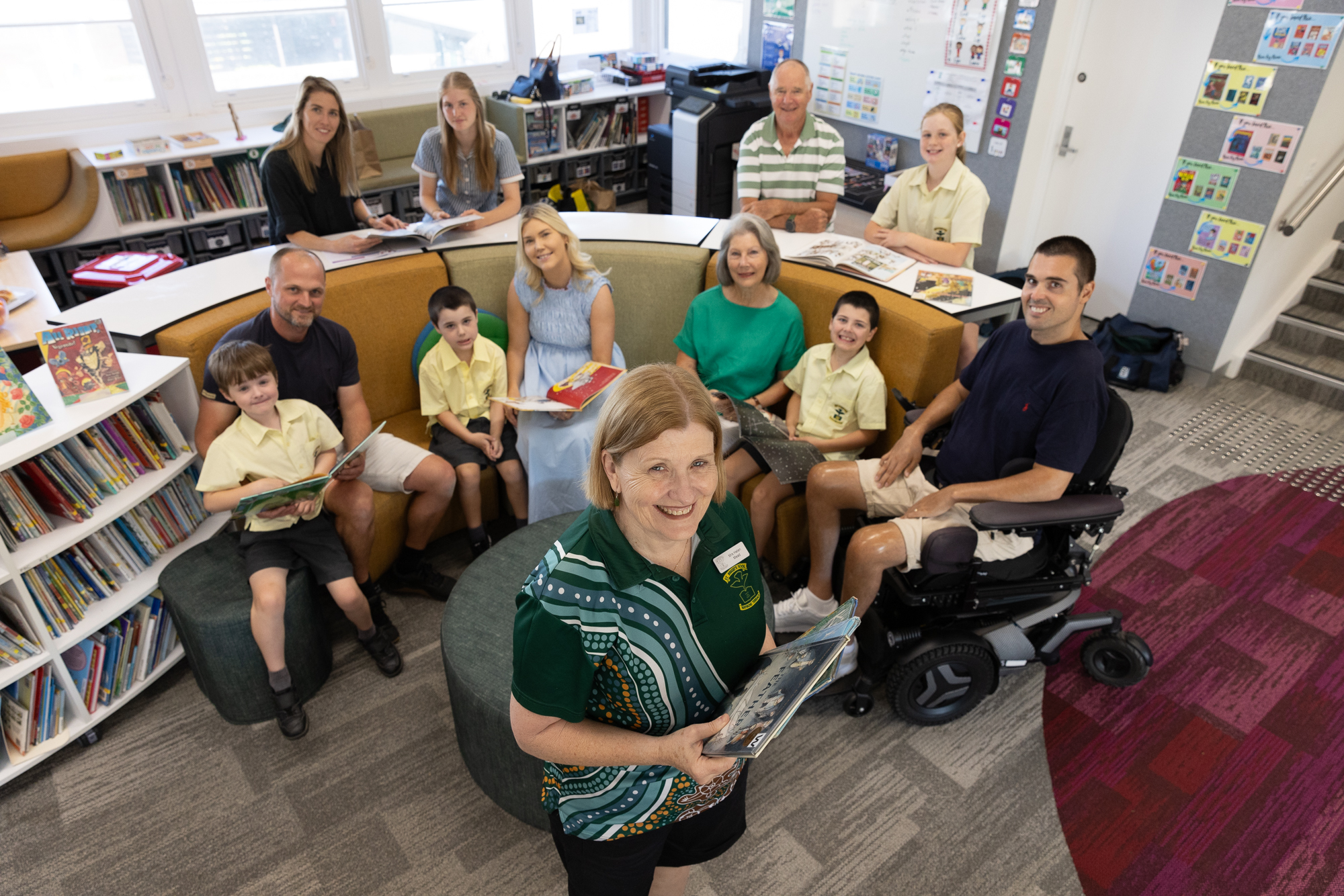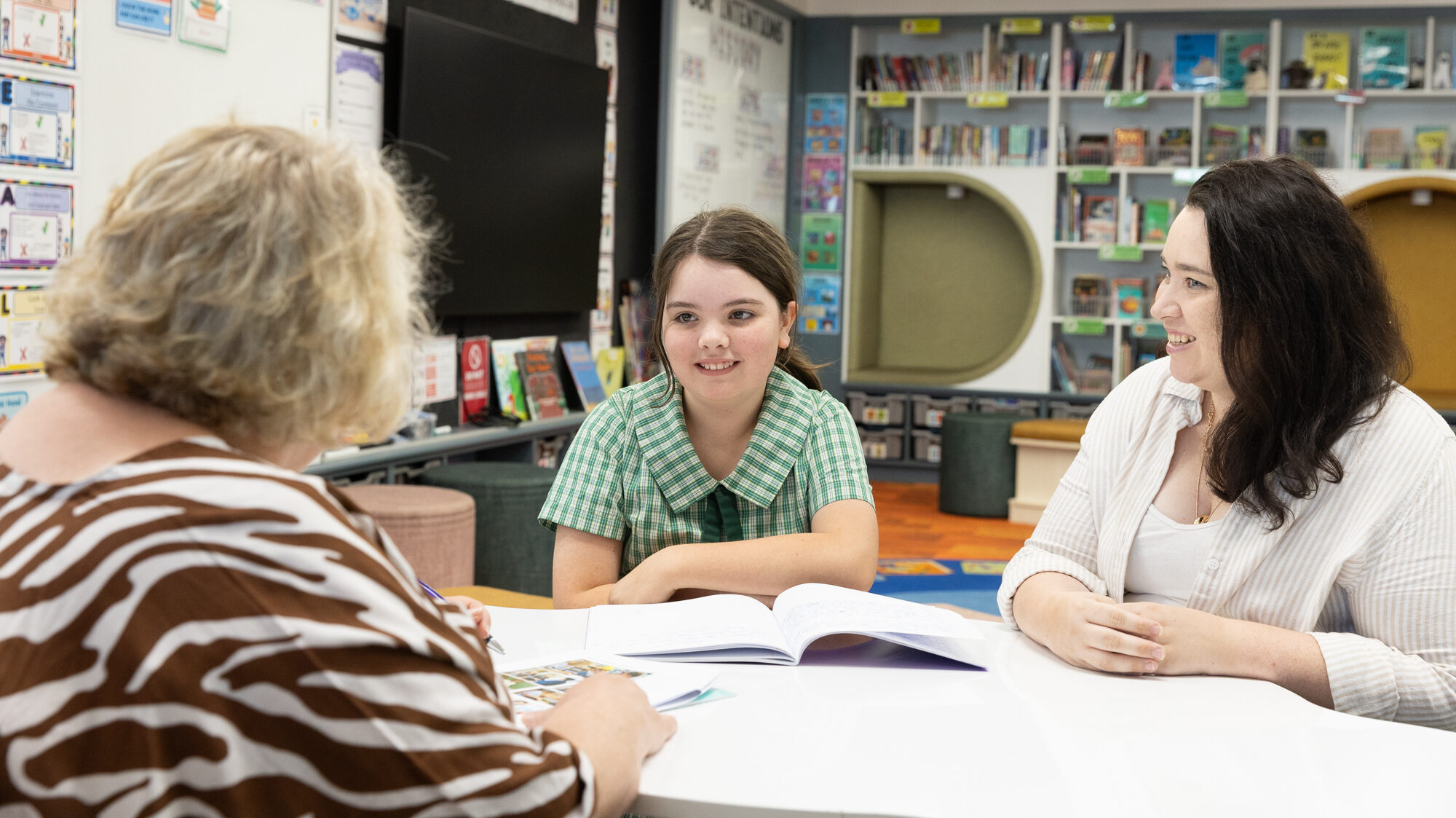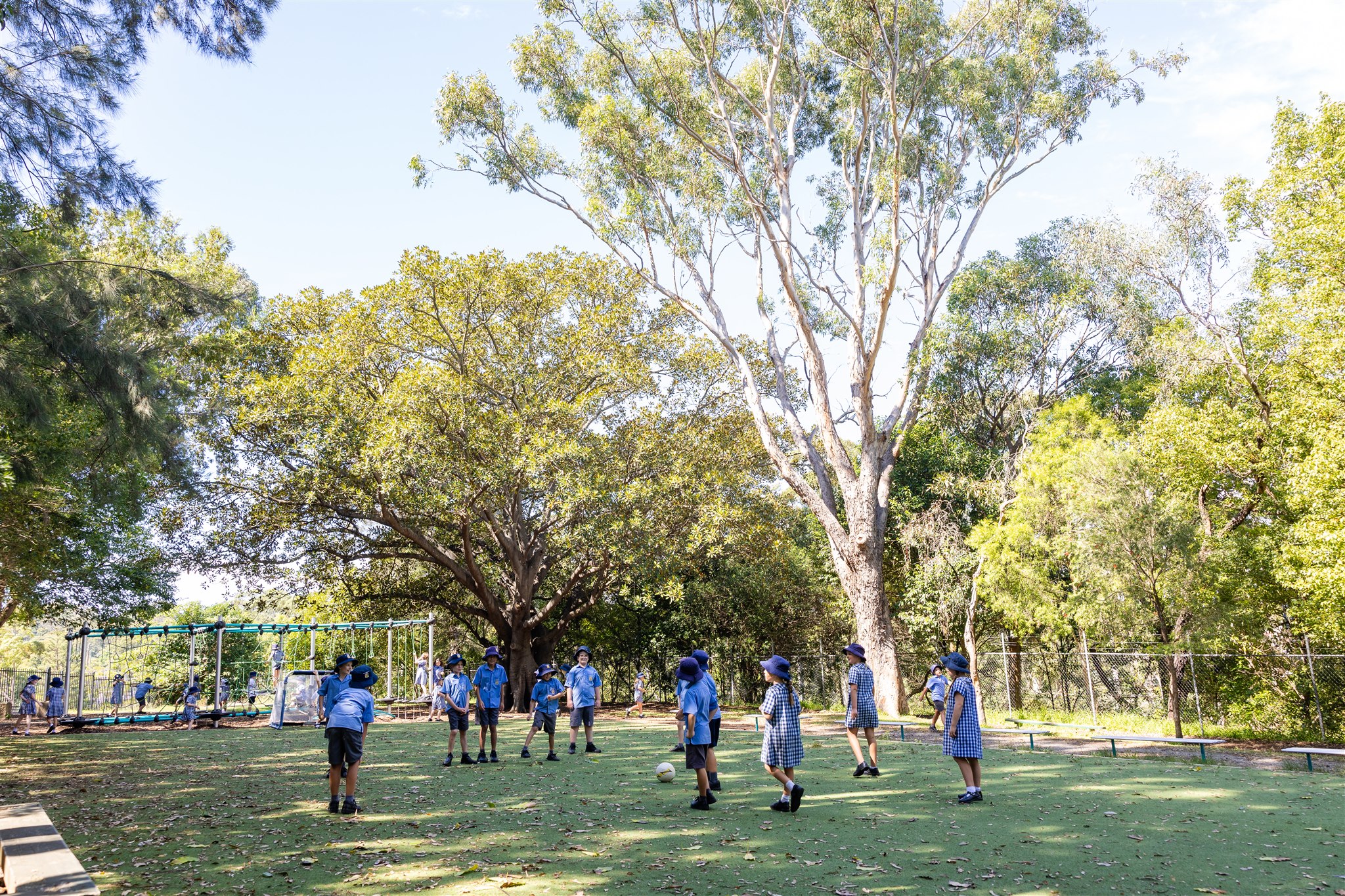
Family, school and community partnerships positively impact student learning and wellbeing.
Our Catholic schools are places that understand, respect and value the dignity of each child and their family. Accordingly, we commit to fostering partnership between parents, carers and staff in the education of all students.
Parent and Carer Information Sessions
We’ve collated a list of webinars and information sessions that may assist parents and carers in supporting the learning and wellbeing of their child.
View list of upcoming webinars here
Fostering family-school partnerships

What frameworks guide our schools’ obligation to develop school-family partnerships?
Fostering family-school partnerships is not only morally important, but a requirement.
Below is a list of guiding documents that inform our school’s family engagement practice and standards.
- School Improvement Tool: Domain 9 – School-Community partnerships
- APST Professional Engagement: Standard 7 – Engage professionally with colleagues, parents/carers and the community.
- AITSL Professional Practice – Engaging and working with the community
- National Catholic Safeguarding Standards- Standard 3 – partnering with families, carers and communities
- Canon Law: 796-2
- Diocese of Maitland-Newcastle Strategic Plan 2022-2026: Aspirations – Community and Partnerships
- Diocese of Maitland-Newcastle Catholic Schools Strategic Plan Strategic Drivers – Culture and Partnerships
- LLC Parameter 12 – Parent and Community Engagement
How does the Diocese of Maitland-Newcastle promote family voice in our schools?
In addition to each school being required to host its own family engagement forum, whether it be a P&F Association, PEG or FACE Forum, the Diocese of Maitland-Newcastle has a peak parent body, named the Federation of P&F Associations.
The Federation was first established in 1981 and provides a valuable link between family engagement forums across the Diocese’s 58 schools.
The Federation’s stated aims include;
- Collaborating with the Bishop, the Catholic Schools Office and its agencies and the Council for Catholic School Parents (NSW & ACT) to promote and foster the development of parent organisations, so as to strengthen the participation of all parents in Catholic schools in the Diocese.
- Promoting Catholic education and identity.
- Building friendly and welcoming communities.
- Bringing together families, students, clergy, parishioners, and staff, both religious and lay, in a spirit of collaboration and close co-operation.
- Providing an educative forum supporting families in their involvement in their children’s spiritual, social and academic development at home and school.
- Providing an educative forum for enriching the learning environment and exploring issues related to the spiritual, social, and academic development of students.
- Providing a consultative forum for families to engage with the School and their child’s learning environment.
- Providing a consultative forum for families to connect with their Principal, Parish Priest, and School staff in furthering the educational endeavours of the School, and;
- Acting as a mechanism for representing families .
An elected Delegate and an Alternate Delegate from the Federation of P & F Associations represent the diocese on the Council of Catholic School Parents.
To get in touch with the Federation of P&F Association President, email lizzie.watkin@mn.catholic.edu.au
Useful Links and Resources
Follow the links below to access the resources.
Anxiety and mental health support
- Beyond Blue
- Be You
- Parent Line
- Health Direct
- Kids Helpline
- Smiling Mind
- Reach Out
- Headspace
- Generation Next
- CatholicCare
Cyber Safety
Cyber Safety is an important modern issue that faces our students and their families. The Catholic Schools Office (CSO) aims to ensure students at each of our schools and their parents or carers are well informed about cyber safety so they have the best possible outcomes from using the internet. Please find some useful links and resources below:
- Office of the eSafety Commissioner
- Cybersafety Solutions
- Bullying. No way!
- Australian Institute of Family Studies
- eSafety
Parenting support
How do schools in the Diocese of Maitland-Newcastle build relationships with families?

Communications platforms
Schools in the Catholic Diocese of Maitland-Newcastle utilise a variety of online communications platforms to inform and engage parents and carers, in a timely and effective manner.
Compass
All our schools use ‘Compass’, a comprehensive information system that enables schools’ staff to effectively manage all information relating to your child and their school journey.
The online platform provides also provides a secure, yet easy, connection point for parents and carers to communicate with the school and receive information about your child’s journey.
When you enrol your child in a Catholic school in the Diocese of Maitland-Newcastle, you should be provided with a letter from the school that includes a unique Compass code that will enable you to receive information that is personalised for your child.
Parents and carers can access Compass via a web browser or, via an app on your tablet or smart phone. All parents and carers are encouraged to download the Compass Parent App, as it is schools’ primary source of information distribution.
Using Compass, parents and carers can:
- Monitor their child/ children’s attendance, and enter in explanations for absences
- View ‘My News’, a news feed of school announcements, newsletters, alerts and updates
- View their child’s schedule, learning tasks and the school calendar
- Download and view you’re their child’s school report (for each year they are enrolled in the school)
- Schedule parent teacher interview bookings and upcoming events.
To learn more about the Compass app and how to use it, please visit Compass For Parents | Compass Education AU
Other communications platforms
In addition to Compass, our schools use a variety of other platforms to communicate with parents, carers and the broader community which may include but not be limited to Seesaw (particularly for children enrolled in Kindergarten, Year 1 and Year 2), school newsletters (which are mostly distributed via Compass), school websites and social media sites including Facebook and Instagram. We encourage parents and carers to have a discussion with your local Catholic school’s leaders to find out which communications channels they use, and for what.
Surveys
To be successful, schools must value the perspectives and opinions of students and their families, and act on them in a way that genuinely shapes learning and decision-making. To this end, schools in the Diocese of Maitland-Newcastle will, from time to time, utilise online surveys to garner the views and opinions of their school community and inform planning.
In addition, every two years the Diocese of Maitland-Newcastle’s Catholic Schools Office- in conjunction with each of its schools- distributes the Tell Them From Me survey. Parents, carers, students and staff are asked to complete the survey.
The Parent and Carer survey is invaluable in ensuring that the Diocese, and its schools, are fostering a school environment where everyone feels safe and welcome, and all students are supported to achieve their potential. In addition, the results from the Tell Them From Me survey help to clarify and strengthen the important relationship between parents and carers and our schools and inform future directions.
Family Engagement Forums
Parent and carer groups established within schools offer an opportunity for families, school staff and clergy to gather, explore, discuss, imagine, implement, support, encourage and journey together as we work in community for the benefit of the children and young people enrolled in our schools.
In the Diocese of Maitland-Newcastle there are three endorsed models for family engagement forums, including; P&F Associations, Parent Engagement Groups (PEGs) and Family and Community Engagement Forums (FACE Forums).
To find out more about the different style of family engagement forum that may be operating in your school, you can read the guidelines for each by clicking on the hyperlink below;
In addition, you may find the following complementary resources useful:
Parent information events and resources
Our schools respect parents and carers as the first and most important educator of their child. As such, the Diocese of Maitland-Newcastle and its schools are individually and collectively committed to anticipating the needs of our unique communities and ensuring families have access to events and resources designed to inform and empower them.
Throughout the year, our schools commit to hosting information sessions on matters of interest to their parent and carer community. In addition, our schools are also encouraged to promote parent information events that are relevant to the school community and that are provided by reputable providers such as the Diocese’s peak parent body, the Federation of P&F Associations, the Council of Catholic School Parents NSW/ACT and, the eSafety Comissioner.
We also recognise that the task of raising happy, healthy and resilient children requires ongoing care and dedication. As such, the Diocese of Maitland-Newcastle has invested in providing each of its school communities with access to School TV- an online platform that provides parents and carers with an extensive range of wellbeing resources.
To access SchoolTV and view the range of resources available from leading health professionals on topics including but not limited to neurodiversity, respectful relationships, online gaming, friendships and bullying, confidence and motivation go to your child’s school’s website and in the search panel, type ‘School TV.’
School reports and discussions with your child’s teacher(s)
Research indicates that family engagement in schools is most effective when it is a shared responsibility that brings families, educators and communities together to co-create strategies that reflect mutually agreed-upon outcomes for children’s learning and wellbeing. As such, the Diocese of Maitland-Newcastle and its schools commit to providing parents and carers with information about their child’s unique learning profile, on multiple occasions throughout the course of the school year.
Detailed below is information about the formalised opportunities for parents and carers to learn more about their child’s learning and social profile. However, it is important that all parents and carers know that they may request a meeting with their child’s teacher at any time throughout the school year. This is particularly important if you have information that you think may assist your child’s teacher(s) to support their learning or wellbeing. For example, your child might have a health condition, you might be concerned about bullying, or there might have been a change in your family, like a death, separation or divorce.
Our schools’ staff try their upmost to be responsive to your needs, but please remember that our schools are very busy places. As such, the best way to arrange a discussion with your child’s teacher(s), or to provide them with written information about their learning and wellbeing, is to email the school.
To find out a school’s email address, visit their website and look for the email address on the ‘contact’ page. By emailing the school it ensures that the relevant staff member will have set aside time to discuss your child’s needs and limits the likelihood of them having to attend to other matters when meeting with you, which can often be the case if a parent or carer shows up unannounced.
Depending on the nature of the email and the matters raised by you, it may take up to three working days for a staff member to respond to your email. As such, if the matter is urgent, please call the school’s office administration and provide them with a brief overview. The administrative assistant will then be able to support you with timely advice on the best course of action, unique to your circumstances.
School reports
In the Diocese of Maitland-Newcastle, reporting is an important part of an ongoing cycle of feedback between home and school each year.
Our schools provide information to parents and carers on their child’s achievement and progress through written reports twice each year, in Term 2 and Term 4. The Student Report is accessible to parents and carers through Compass. An opportunity is provided for parents/caregivers to discuss each report with the teacher, or request information that shows a child’s achievement in the Key Learning Areas in comparison to other children in the same grade at the school.
Parent/carer discussions with educators
Our schools commit to inviting parents and carers to have a discussion with their child’s teacher(s), at least twice a year. How schools conduct these discussions may vary and will often be a ‘student-led conference’ or, a ‘parent-teacher’ interview- both styles of meeting typically last around 10-15 minutes each.
A student-led conference is, as the name suggests, typically led by the student with the support of their teacher. Each student is invited to prepare for the meeting and articulate their learning successes and future goals. Parents and carers play an important role in the meeting by listening to their children articulate their goals, showing an interest in what they are learning and, offering support for them to achieve their goals. Importantly, this style of discussion promotes student voice and provides parents and carers with an opportunity to hear what learning expectations are in place for students and, to see how their child is progressing towards meeting those expectations.
A parent-teacher interview does not typically include students, but rather allows the parent/ carer to discuss their child’s development at school with their teacher(s). Whilst referred to as an ‘interview’ they typically are quite informal and provide an opportunity for parents/carers and educators to develop a collaborative relationship for the benefit of the child, by sharing insights and ideas about the students’ learning style and social development. Ahead of attending a parent-teacher interview, parents and carers may like to think about areas of their child’s progress and development they would like to discuss.
Regardless of the style of meeting offered by your child’s school, parents and carers are strongly encouraged to attend these discussions, as it shows your child that you’re interested in their learning and life at school. In addition, they provide parents and carers with an opportunity to;
- meet and get to know your child’s teachers
- help your child’s teachers understand more about your child
- learn more about your child’s academic, emotional and social development
- make plans with your child’s teacher about how to support your child
- build a relationship with your child’s school
For more information about what to expect from parent-teacher interviews and student-led conferences, including tips on how you may like to prepare, you are encouraged to visit Raising Children’s website. Parents and carers of children in primary school can access useful information on this page, and parents and carers of children in secondary school can access useful information on this page.

Partnerships in Transition
A support guide
Partnerships in Transition intends to strengthen the family-school partnership, by ensuring that parents and carers are fully informed about the range of supports and options available in our diocesan schools for students with diverse learning needs. Transitioning from one school or setting to another, or from school to post-school options, is a significant event for children, young people, and their families.
Learn more